Lasswell Harold D. The Political Writings of Harold D. Lasswell
Подождите немного. Документ загружается.

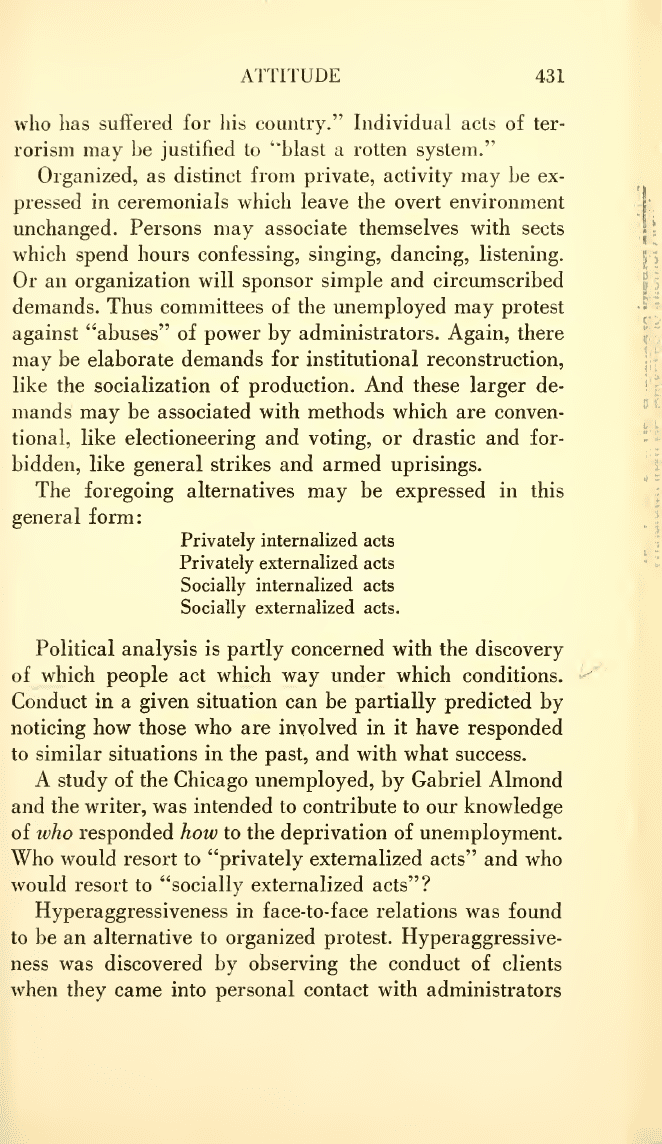
ATTITUDE
431
who
has
suffered for his country." Individual acts
of ter-
rorism may
be
justified
to ''blast a rotten
system."
Organized,
as
distinct from private, activity may be ex-
pressed in ceremonials which leave the overt
environment
unchanged. Persons may associate themselves
with
sects
which spend hours confessing,
singing, dancing, listening.
Or an organization will
sponsor simple and circumscribed
demands. Thus
committees of the unemployed
may
protest
against "abuses" of
power
by
administrators. Again,
there
may be elaborate demands for
institutional reconstruction,
like the socialization
of
production. And these larger
de-
mands
may be associated
with methods which are
conven-
tional, like electioneering and voting, or drastic
and
for-
bidden, like general strikes and armed uprisings.
The foregoing alternatives
may be
expressed in this
general form:
Privately internalized
acts
Privately
externalized
acts
Socially internalized acts
Socially externalized acts.
Political analysis is
partly
concerned with the
discovery
of which people act which way under which conditions.
Conduct in a given
situation
can be
partially
predicted
by
noticing how those who are involved in it have
responded
to
similar situations in the
past, and with what success.
A
study of
the Chicago unemployed,
by Gabriel Almond
and the writer, was intended
to
contribute to
our knowledge
of who responded how to the deprivation
of
unemployment.
Who would
resort
to
"privately
externalized acts" and
who
would resort
to
"socially externalized
acts"?
Hyperaggressiveness in face-to-face relations was
found
to be an alternative to organized protest.
Hyperaggressive-
ness was discovered by observing the conduct
of clients
when
they came into personal contact
with
administrators
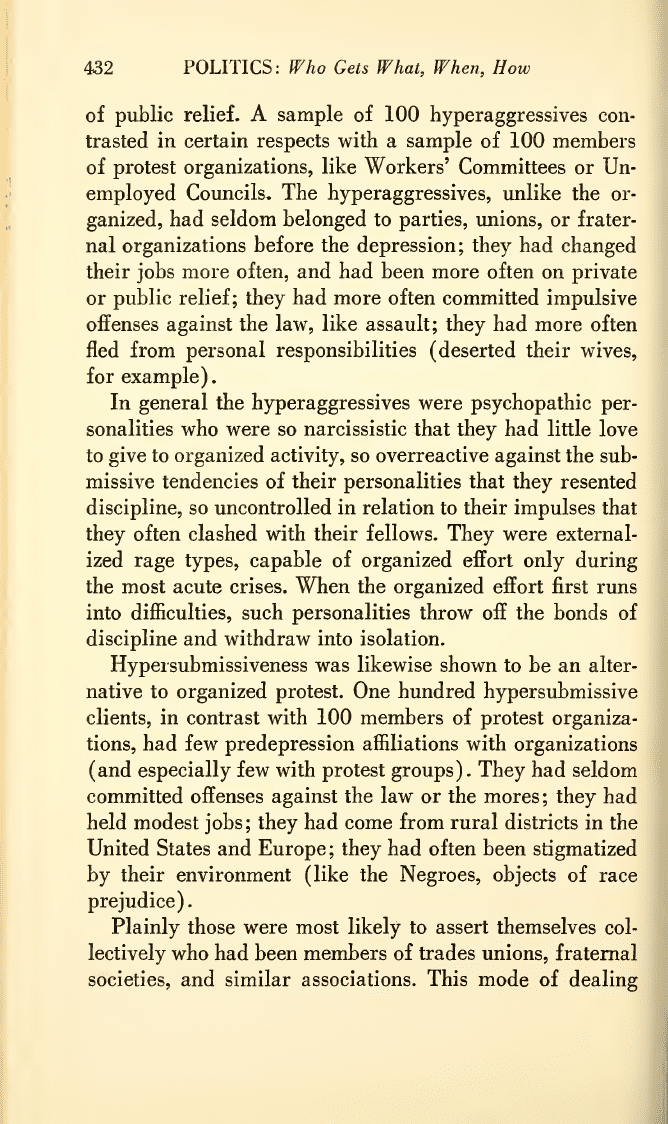
432
POLITICS:
Who
Gets
What, When,
How
of
public relief. A
sample
of 100 hyperaggressives
con-
trasted in
certain respects with
a
sample
of 100 members
of
protest organizations, like Workers' Committees
or Un-
employed Comicils,
The
hyperaggressives, milike
the or-
ganized,
had
seldom belonged to parties, unions,
or frater-
nal
organizations before the depression; they
had changed
their jobs
more often, and
had been more often
on private
or
public
relief; they had more often committed
impulsive
offenses
against
the
law, like
assault; they had more
often
fled from
personal responsibilities (deserted their
wives,
for
example).
In
general
the
hyperaggressives were
psychopathic per-
sonalities
who
were
so
narcissistic
that
they
had little
love
to
give to organized activity,
so
overreactive against
the sub-
missive tendencies of their personalities that
they resented
discipline, so uncontrolled in relation
to
their impulses
that
they often clashed with their fellows. They were external-
ized rage types, capable of organized effort only during
the most acute crises.
When
the organized effort first runs
into difiiculties, such
personalities
throw off the bonds
of
discipline
and
withdraw into isolation.
Hypersubmissiveness
was
likewise shown
to
be
an alter-
native to
organized protest. One hundred
hypersubmissive
clients, in contrast with 100 members of protest
organiza-
tions, had few predepression affiliations with organizations
(and especially few with protest groups). They had
seldom
committed offenses
against the
law or the mores; they
had
held modest jobs; they had
come from rural districts
in the
United States
and
Europe; they had often been
stigmatized
by their environment (like the Negroes, objects
of race
prejudice).
Plainly
those
were
most
likely
to
assert
themselves
col-
lectively who
had
been members of
trades
unions, fraternal
societies,
and similar
associations. This
mode of dealing
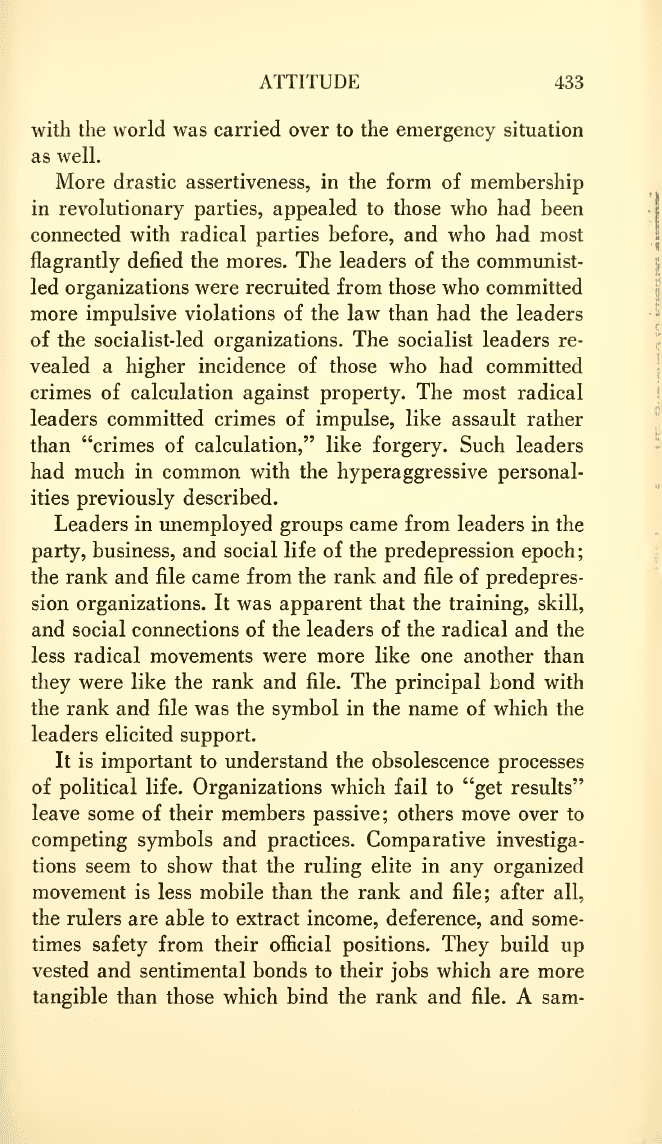
ATTITUDE
433
with the
world was carried over
to
the emergency
situation
as
well.
More drastic assertiveness, in the form of membership
in
revolutionary parties,
appealed
to those
who had been
connected
with radical parties before, and
who had most
flagrantly defied the mores.
The
leaders
of the
communist-
led
organizations were recruited
from
those
who committed
more impulsive
violations
of
the
law than had the leaders
of the socialist-led
organizations.
The socialist leaders re-
vealed a higher incidence of
those
who had committed
crimes of calculation
against property.
The most
radical
leaders committed crimes of impulse, like assault
rather
than
"crimes
of
calculation," like forgery.
Such leaders
had much
in common with the hyperaggressive
personal-
ities previously
described.
Leaders in unemployed groups came from leaders
in
the
party, business, and social life of the predepression epoch;
the rank and file came from the
rank
and file
of
predepres-
sion organizations. It was apparent that the training, skill,
and
social connections
of
the leaders
of the
radical
and the
less radical movements were more like one another
than
they
were
like
the
rank and file.
The
principal
bond with
the rank and file
was the
symbol
in the name of which the
leaders elicited
support.
It is important
to
understand the
obsolescence processes
of political life. Organizations which fail
to "get results"
leave some
of
their members passive; others
move over to
competing symbols and practices. Comparative
investiga-
tions
seem to
show
that the ruling elite in any organized
movement
is less mobile than
the
rank and file; after
all,
the rulers
are able to extract income, deference, and
some-
times safety
from
their official positions.
They build
up
vested and sentimental bonds
to
their jobs which
are
more
tangible
than
those
which bind the rank and
file. A sam-
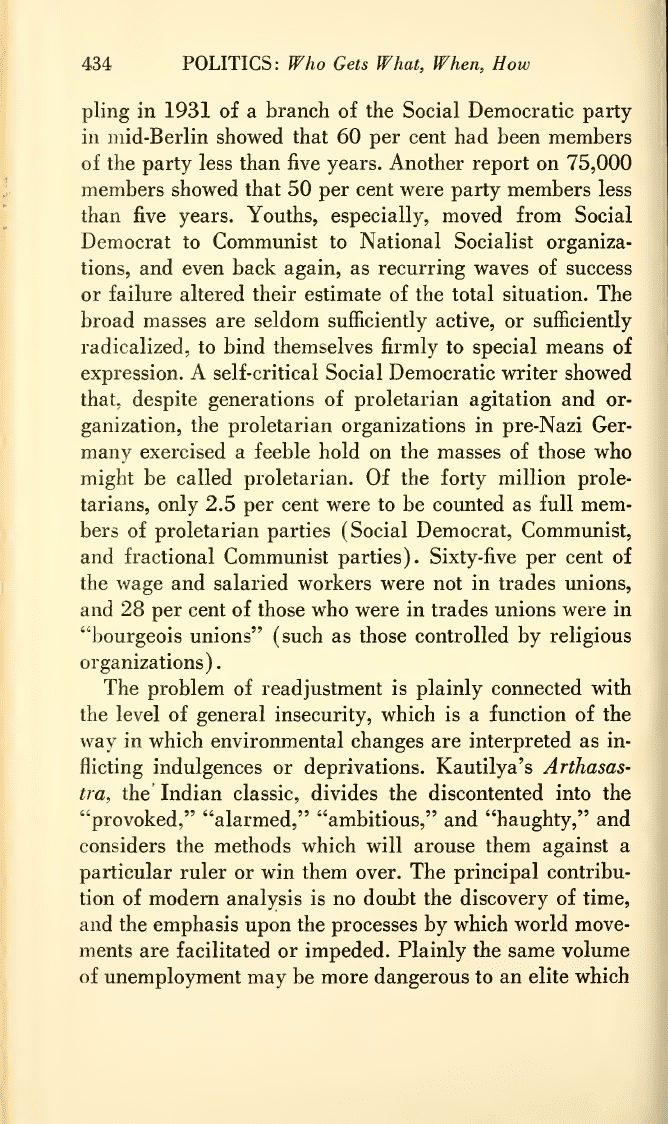
434
POLITICS: Who Gets What, When, How
pling in 1931
of a
branch of the Social Democratic party
in mid-Berlin showed
that
60
per cent
had been members
of the party less than
five years. Another report
on
75,000
members showed that 50 per cent were
party
members
less
than
five
years. Youths, especially, moved from
Social
Democrat to Communist to National Socialist organiza-
tions, and even back again, as
recurring
waves of success
or failure altered
their
estimate of the total situation. The
broad masses are
seldom sufficiently
active, or
sufficiently
radicalized,
to bind
themselves firmly
to special means
of
expression. A self-critical Social Democratic writer
showed
that, despite generations
of
proletarian agitation
and or-
ganization, the proletarian organizations
in
pre-Nazi
Ger-
many
exercised
a
feeble hold
on
the masses
of
those
who
might
be called
proletarian.
Of
the forty million prole-
tarians, only 2.5 per cent were to
be
counted
as
full mem-
bers
of
proletarian parties (Social Democrat, Commimist,
and
fractional Communist parties).
Sixty-five
per cent of
the wage
and salaried workers were not in trades
unions,
and 28
per cent of those who were in trades unions
were
in
"bourgeois unions" (such as those controlled by
religious
organizations).
The
problem of readjustment is plainly
connected with
the
level of general insecurity, which is a
function
of the
way in which
environmental changes are
interpreted
as
in-
flicting indulgences
or
deprivations. Kautilya's Arthasas-
tra, the Indian
classic,
divides
the
discontented into the
"provoked,"
"alarmed,"
"ambitious,"
and
"haughty," and
considers the methods which will arouse them against a
particular ruler
or
win them over. The principal
contribu-
tion
of modern analysis is no doubt the discovery of
time,
and
the emphasis upon the processes by which
world move-
ments are
facilitated or
impeded. Plainly
the
same volume
of
unemployment
may be
more dangerous
to
an elite
which
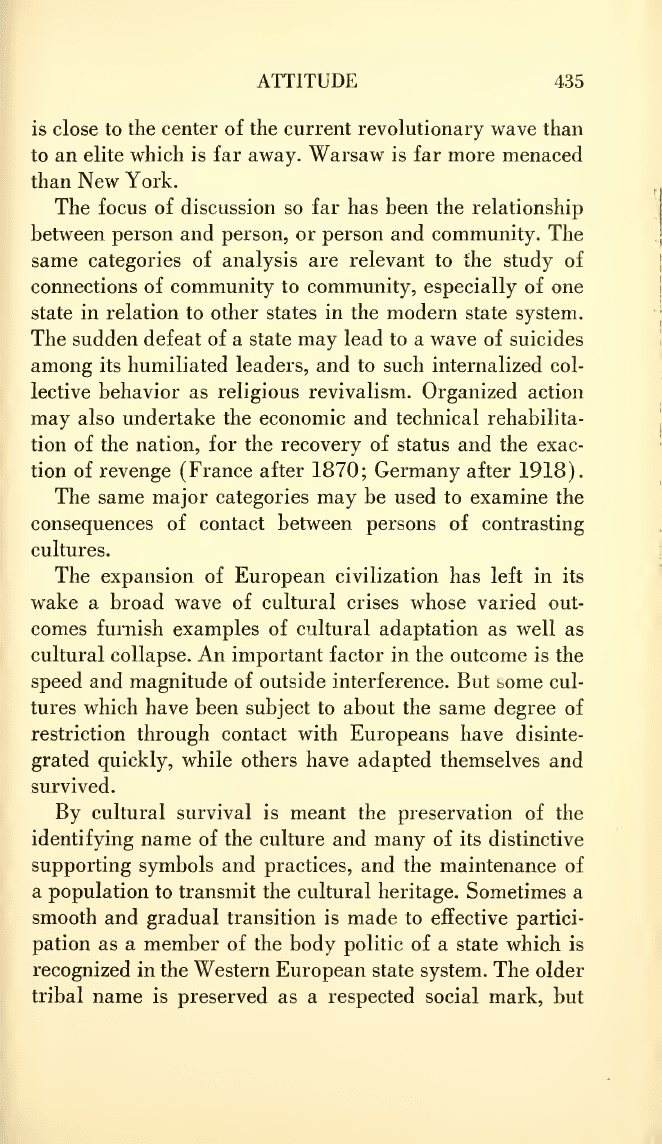
ATTITUDE
435
is
close to
the center of the current revolutionary
wave than
to an elite
which is far
away.
Warsaw is far more
menaced
than New
York.
The focus
of discussion
so
far has been the relationship
between
person and person,
or
person and community.
The
same
categories
of
analysis are relevant
to
the
study of
connections of
community
to
community, especially
of one
state in
relation
to other
states in the modern
state system.
The sudden
defeat
of a state
may
lead to a wave of suicides
among its humiliated leaders,
and to
such internalized
col-
lective behavior
as
religious
revivalism. Organized
action
may
also undertake the economic and technical rehabilita-
tion of
the nation, for
the
recovery of status and
the exac-
tion of revenge
(France after
1870;
Germany
after
1918).
The same
major
categories may be used to examine
the
consequences of contact between persons
of
contrasting
cultures.
The expansion
of
European civilization
has left in its
wake
a broad
wave
of
cultural crises
whose varied
out-
comes furnish
examples of
cultural
adaptation
as well as
cultural
collapse.
An important factor in
the outcome is
the
speed
and
magnitude of
outside interference.
But bome
cul-
tures
which have been subject to about the same degree
of
restriction
through contact
with Europeans
have
disinte-
grated quickly,
while others have adapted themselves
and
survived.
By cultural survival
is meant the preservation
of the
identifying
name of the culture and many
of
its distinctive
supporting
symbols
and practices,
and the maintenance
of
a population
to transmit the
cultural heritage.
Sometimes a
smooth
and
gradual transition
is
made
to effective
partici-
pation
as a member of the
body
politic
of a state which is
recognized
in the Western European state system.
The
older
tribal
name is preserved
as a
respected social
mark, but
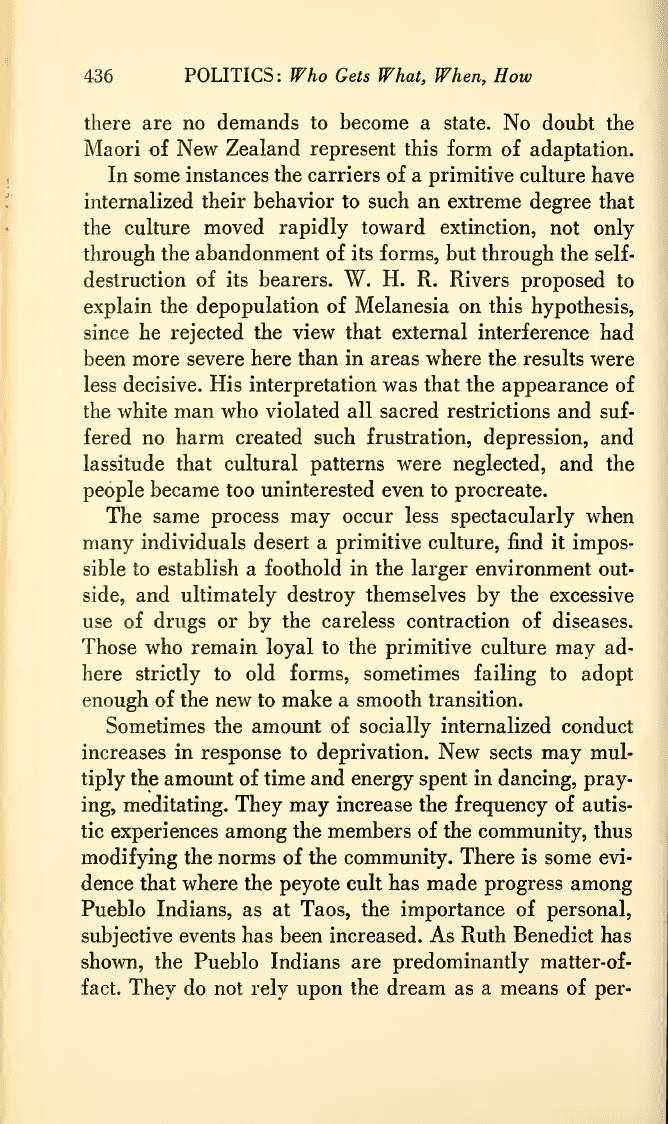
436
POLITICS: Who Gets What,
When, How
there are no
demands to become
a state.
No doubt the
Maori of
New
Zealand represent
this form
of adaptation.
In
some instances
the carriers
of a primitive
culture have
internalized
their behavior to
such an
extreme
degree
that
the culture
moved rapidly toward extinction,
not
only
through
the abandonment of its forms, but through
the
self-
destruction of its
bearers.
W.
H.
R.
Rivers
proposed
to
explain
the depopulation of Melanesia on this
hypothesis,
since
he
rejected the view that external interference
had
been
more severe here
than
in
areas
where the results
were
less decisive.
His interpretation
was
that
the appearance
of
the white
man who violated all sacred
restrictions
and suf-
fered no
harm created such frustration,
depression, and
lassitude that
cultural patterns
were neglected, and
the
people became too
uninterested even
to
procreate.
The same
process may occur less spectacularly
when
many
individuals desert
a
primitive culture, find
it impos-
sible to
establish
a
foothold in the larger environment
out-
side, and
ultimately destroy themselves
by the excessive
use of
drugs or
by
the careless contraction
of
diseases.
Those who remain loyal to the primitive culture
may ad-
here strictly to
old
forms, sometimes failing to
adopt
enough of the new
to
make a smooth
transition.
Sometimes the amount of
socially
internalized conduct
increases in response
to
deprivation. New sects may mul-
tiply the amount of time and energy spent in dancing, pray-
ing, meditating. They may increase the frequency of autis-
tic experiences among the
members
of the
community,
thus
modifying the norms of the
community. There
is
some evi-
dence that where the peyote
cult has
made
progress among
Pueblo
Indians, as at Taos, the
importance
of
personal,
subjective events has
been increased. As Ruth Benedict has
shown, the Pueblo Indians are
predominantly
matter-of-
fact. They do not rely upon
the dream
as
a means
of per-
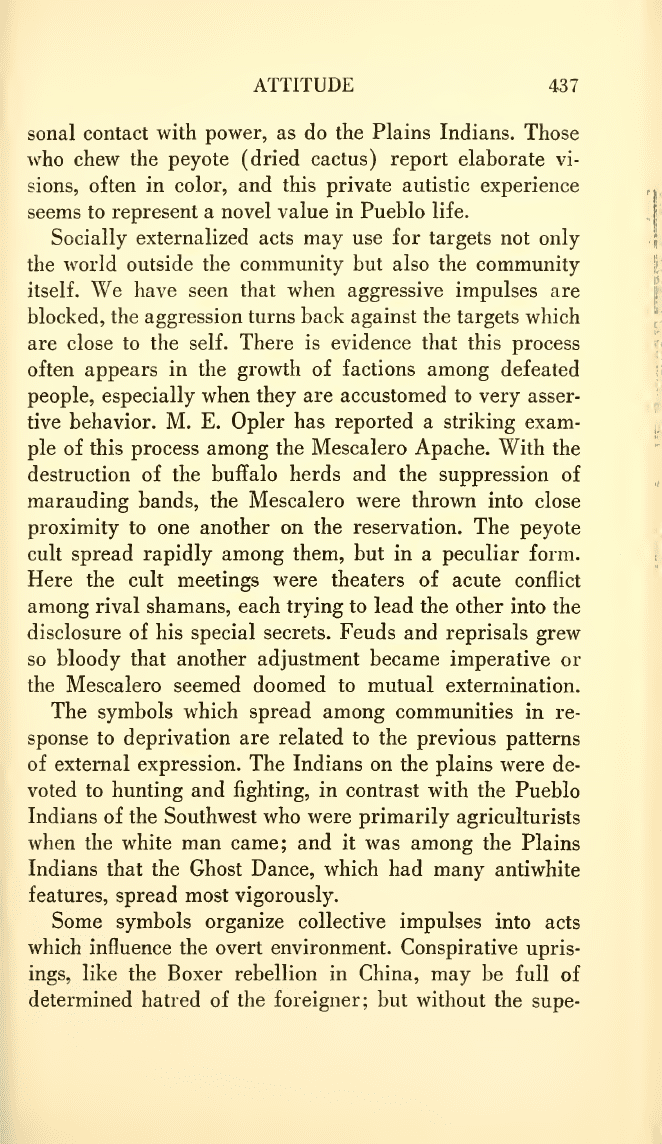
ATTITUDE
437
sonal contact
with
power,
as do
the Plains
Indians.
Those
who chew
the peyote
(dried cactus) report
elaborate
vi-
sions,
often
in color, and this private autistic
experience
seems to
represent a novel
value
in
Pueblo life.
Socially
externalized acts may use for targets
not only
the
world outside the
community but also
the community
itself. We have
seen that when aggressive
impulses are
blocked, the
aggression turns back against the
targets which
are close
to the self. There
is evidence
that this
process
often
appears in the
growth
of
factions among
defeated
people,
especially when they
are accustomed
to very
asser-
tive behavior. M.
E. Opler has
reported
a striking exam-
ple of this
process among the Mescalero Apache. With
the
destruction of
the buffalo
herds
and the suppression
of
marauding bands, the
Mescalero were thrown
into close
proximity
to
one another on
the
reservation. The
peyote
cult
spread rapidly among them, but in
a
peculiar
form.
Here
the cult
meetings were theaters of
acute conflict
among
rival shamans, each
trying
to lead the other
into the
disclosure of his
special secrets. Feuds
and reprisals
grew
so bloody that
another adjustment
became
imperative or
the
Mescalero seemed doomed to mutual extermination.
The symbols which
spread
among communities
in
re-
sponse to deprivation
are related
to the previous
patterns
of
external
expression.
The
Indians
on the plains
were
de-
voted to hunting
and fighting,
in contrast with the
Pueblo
Indians
of the
Southwest
who were primarily
agriculturists
when
the white
man came; and
it was among
the Plains
Indians
that the
Ghost Dance,
which had many
antiwhite
features, spread most vigorously.
Some symbols organize collective impulses
into acts
which influence
the
overt environment.
Conspirative
upris-
ings, like the Boxer rebellion in China, may
be
full
of
determined hatred
of
the foreigner; but without
the
supe-
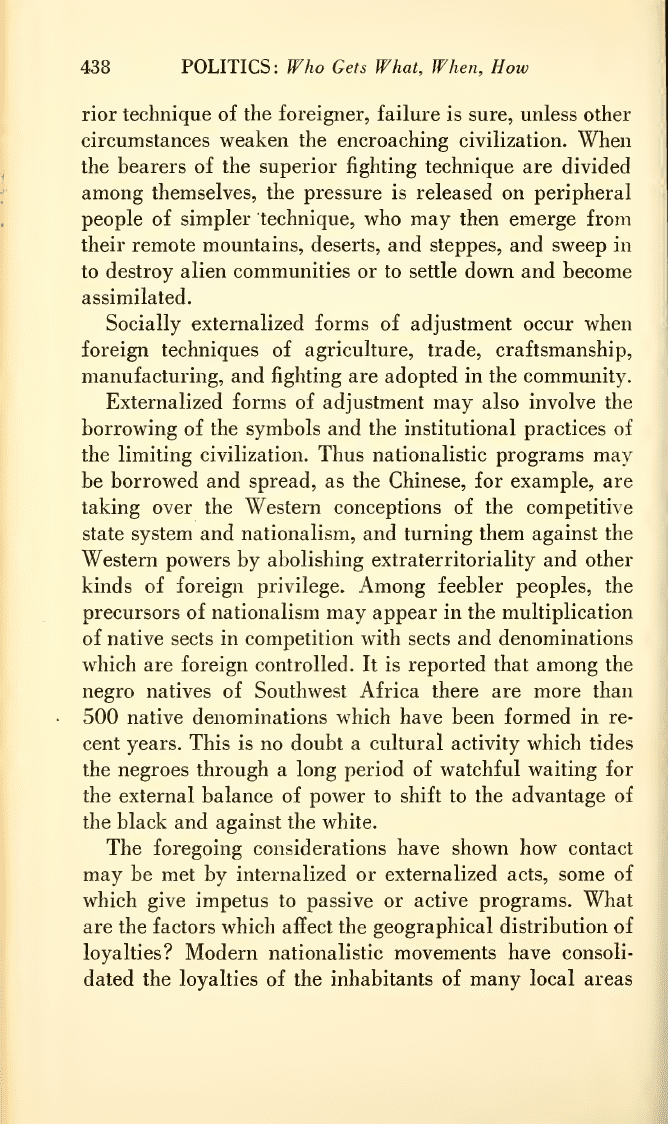
438
POLITICS: Who Gets What,
When,
How
rior technique of
the foreigner,
failure is sure, unless
other
circumstances
weaken the
encroaching civilization. When
the
bearers of the superior fighting technique
are divided
among themselves, the pressure is released on peripheral
people of
simpler technique,
who may then emerge from
their remote
mountains, deserts, and steppes,
and sweep
in
to destroy
alien communities or to settle
down and become
assimilated.
Socially externalized forms of adjustment occur when
foreign techniques of
agriculture,
trade, craftsmanship,
manufacturing, and
fighting
are adopted in the community.
Externalized forms
of
adjustment may also involve the
borrowing
of the
symbols
and
the institutional practices
of
the
limiting civilization. Thus nationalistic programs
may
be
borrowed and spread,
as the
Chinese, for example, are
taking over
the
Western conceptions of the competitive
state
system and nationalism, and turning them against the
Western
powers
by
abolishing extraterritoriality and other
kinds of foreign privilege. Among feebler
peoples,
the
precursors of nationalism may appear in the multiplication
of native sects in competition with sects and denominations
which are foreign controlled. It is reported that among the
negro natives of Southwest Africa
there
are
more than
500 native denominations which have
been formed in re-
cent
years.
This is no doubt a
cultural activity which tides
the
negroes through
a
long period of watchful waiting
for
the external balance
of
power
to
shift to the advantage of
the black and against the white.
The foregoing considerations have
shown how contact
may be met by
internalized or externalized acts, some of
which give impetus to passive or active
programs. What
are the factors which affect the
geographical distribution of
loyalties? Modern
nationalistic movements have consoli-
dated
the
loyalties
of the
inhabitants of many local
areas
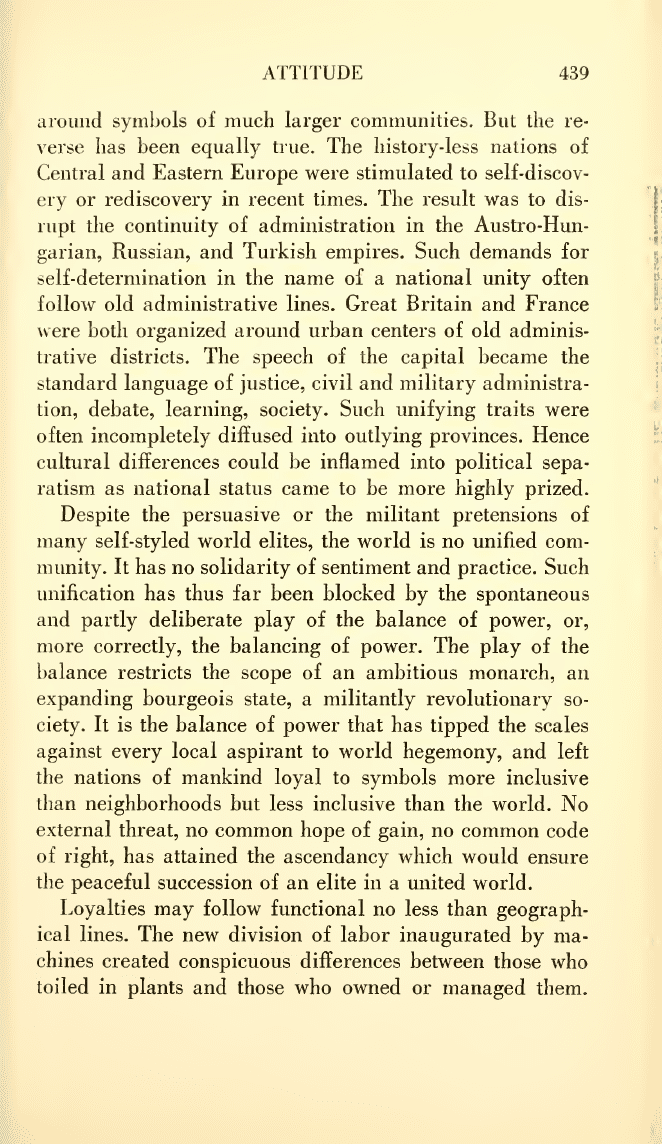
ATTITUDE
439
around symbols
of much larger communities.
But the re-
verse has been
equally true. The history-less nations
of
Central and
Eastern Europe
were
stimulated to self-discov-
ery or
rediscovery in recent times. The result was
to dis-
rupt the
continuity of administration in the Austro-Hun-
garian,
Russian,
and
Turkish empires. Such demands
for
self-determination
in the
name of
a
national unity
often
follow old
administrative lines.
Great
Britain
and France
were
both
organized around urban centers
of
old adminis-
trative districts. The speech of the capital became
the
standard
language of justice, civil and military administra-
tion,
debate,
learning, society.
Such
unifying traits
were
often incompletely diifused into outlying provinces.
Hence
cultural differences could be inflamed into political
sepa-
ratism
as
national status came to
be
more
highly prized.
Despite the persuasive
or
the militant pretensions
of
many
self-styled
world
elites,
the world is no unified com-
munity.
It has no solidarity of sentiment and practice.
Such
unification has thus far been blocked
by
the
spontaneous
and partly deliberate play of the balance
of power, or,
more
correctly, the balancing of power. The
play of
the
balance
restricts the scope of an ambitious
monarch,
an
expanding
bourgeois state,
a
militantly
revolutionary
so-
ciety. It
is the balance of power that has
tipped the
scales
against
every local aspirant to world
hegemony, and
left
the
nations of mankind loyal to symbols
more inclusive
than
neighborhoods but
less
inclusive
than the world.
No
external
threat, no common hope
of
gain,
no common
code
of right,
has attained the ascendancy which
would
ensure
the
peaceful succession
of an elite in
a
united
world.
Loyalties may follow
functional
no less
than
geograph-
ical lines.
The
new
division
of labor inaugurated
by
ma-
chines
created conspicuous differences
between
those
who
toiled
in plants and those who owned or
managed
them.
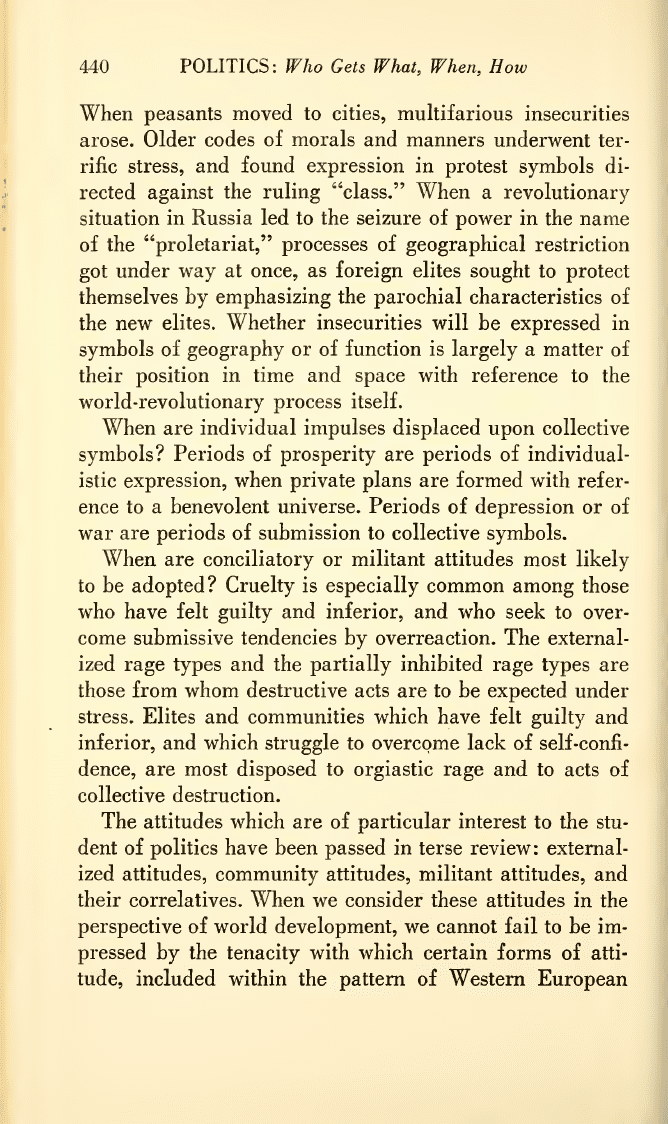
440
POLITICS: Who Gets
What, When, How
When peasants
moved to cities, multifarious
insecurities
arose.
Older codes of
morals
and manners
underwent ter-
rific
stress, and
found expression in
protest
symbols di-
rected against
the ruling "class." When
a revolutionary
situation
in Russia led to the seizure
of power in the name
of the
"proletariat,"
processes
of geographical
restriction
got
under way at once, as
foreign
elites
sought to protect
themselves by
emphasizing the parochial
characteristics
of
the
new
elites. Whether insecurities
will be expressed in
symbols
of geography or of function is largely
a matter of
their
position in
time
and space with reference
to the
world-revolutionary
process
itself.
When are
individual impulses
displaced upon
collective
symbols?
Periods
of prosperity are periods of individual-
istic expression, when private plans are formed
with refer-
ence to a benevolent
universe.
Periods
of
depression
or of
war
are
periods of
submission
to collective symbols.
When are conciliatory or
militant
attitudes most
likely
to be adopted?
Cruelty
is especially common among
those
who have felt
guilty and
inferior, and who
seek to over-
come submissive
tendencies
by overreaction.
The
external-
ized
rage types and the
partially
inhibited rage
types
are
those from whom destructive acts are
to be expected under
stress. Elites and communities
which have felt guilty
and
inferior, and which struggle
to
overcome
lack of self-confi-
dence, are most disposed to orgiastic rage
and to acts
of
collective destruction.
The attitudes which are
of
particular interest
to the stu-
dent of politics have been passed in terse review: external-
ized attitudes, community
attitudes,
militant
attitudes,
and
their correlatives. When
we consider these attitudes in the
perspective
of
world development,
we
cannot
fail to be im-
pressed
by the tenacity with which certain
forms of atti-
tude,
included within the pattern of Western European
